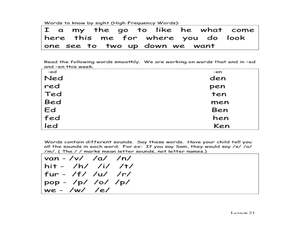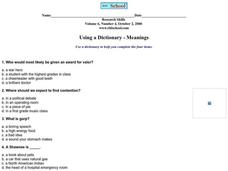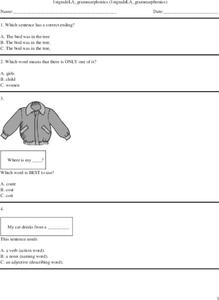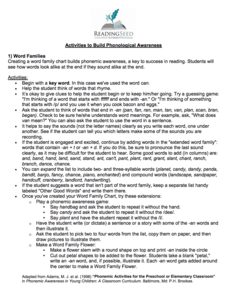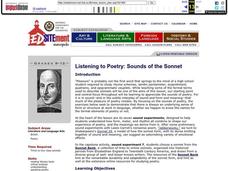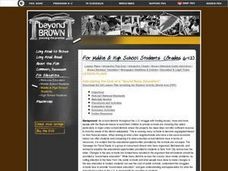Curated OER
Big Cats Sounds
Young scholars explore the sounds of big cats. In this animal science lesson, students listen to the sounds of the big cats, such as lions and tiger, on a suggested website. Young scholars research how the big cats use their sounds and...
Curated OER
Short Vowel Sounds
Learners write down all short vowel sounds. They read their spelling words and attach them to each short vowel sound. They practice writing each spelling word under each short vowel sound that they have listed on their paper. They...
Curated OER
Identify letters and sounds
In this letters, words, and sounds worksheet, students say sounds, identify letters, read sentences, read words, and read -ed and -en words. Students complete 6 activities total.
Curated OER
Using a Dictionary--Meanings
In this meaning of words worksheet, learners utilize a dictionary to look up four words and choose through multiple choice answers the best definition for each word.
Curated OER
1st Grade Grammar/Phonics
In this grammar and phonics worksheet, 1st graders complete multiple choice questions about fill in the blanks to sentences, punctuation, letter sounds, and more. Students complete 15 questions.
Curated OER
Faulkner's "The Sound and the Fury" April Eighth, 1928: Narrating from an 'Ordered Place'?
Students analyze the Dilsey chapter to gain an understanding of "The Sound and the Fury's" far-reaching place within a socially changing South.
American English
Welcome to the Color Vowel Chart
Focus English language learners' attention on word stress and phrase stress with a pronunciation chart that breaks the sounds into moving and non-moving vowel sounds. The chart tool uses colors and key words to indicate...
Literacy Connects
Activities to Build Phonological Awareness
Begin your reading program each day with a mini lesson on phonological awareness using these engaging activities listed in the resource. Young ones will enjoy word families, clapping and counting syllables, identifying single sounds...
Achieve3000
Discriminating Phonemes 2
Some sounds sound very similar! Help your class learn how to distinguish between various sounds by following the steps outlined in this plan. The plan includes a warm-up, a teacher-led portion, and details for guided and independent...
Curated OER
Fun With Fluency
Practice reading with fluency by blending words together. To start, prepare flash cards with pseudowords on them (words that can be pronounced but have no real meaning), and work with the class to sound out the words using known...
Rochester Institute of Technology
Artificial Hearing
Your sense of hearing depends upon tiny hairs deep inside your ear and if you lose these hairs, you lose your hearing. Here, groups explore hearing through the decibel measurement of common sounds. As a class, participants discuss...
Acoustical Society of America
Musical Instruments: Part I
Pupils construct and play various musical instruments made from straws and bottles. They investigate how changes in their instruments result in tone changes. Learners change the lengths and amount of water in the instruments and...
It's About Time
Speedy Light
We know the speed of light, but can we measure the speed of dark? During the lesson, scholars perform gedanken, or thought experiments related to the speed of sound and the speed of light.
Curated OER
A Nice Story
Explore word choice in writing. Your class listens to a short story entitled "A Nice Day" (included) and discusses how the story could be improved. Pupils replace the word nice throughout the story with various synonyms, then reread the...
Curated OER
Listening to Poetry: Sounds of the Sonnet
High schoolers experience and enjoy the sounds of poetry. They erform sound experiments with sonnets and closely read and analyze a sonnet by Shakespeare. Students write an analysis of how sound affects meaning in a sonnet chosen from...
Curated OER
Calculating the Cost of a "Sound Basic Education"
Young scholars state their opinions about school funding and the use of monetary resources by school districts and use reasons, facts, and examples to support their ideas. They compare sets of data related to school funding and draw...
Curated OER
R-E-S-P-E-C-T Find Out What is Means To Us!
Students, while discussing and brainstorming all they already know about the concept of respect, create and illustrate the concept of respect through an acrostic poem. They assess what respect looks and sounds like at school and then...
Curated OER
Sound Spelling
Practice how to change words by switching out letters that make different sounds with youngsters. The teacher encourages spellers to, "Think of words that rhyme with "bug." As the kids come up with words like, "rug," "tug," and "mug,"...
Curated OER
Learning Opposite Words
Young readers explore words that are opposites. They define "opposites" and complete a worksheet matching words that are opposites. A very basic, but educationally sound lesson.
Curated OER
Sound Stretching
In this basic vowel and consonant blending lesson, young learners are shown how to "blend" the sounds of different letters together in order to make a word. Simple words such as, "sun," "moon," and, "ant," are used in a whole-class setting.
Curated OER
Sounds Like Science - Guitars
Students discover that all movement produces sound waves but not all sounds can be heard with the human ear. They experiment with a variety of substances to see which are audible and which are inaudible.
Curated OER
Science, Sounds And Hearing
Middle schoolers examine various sounds that are played on musical instruments. They conduct an experiment to listening to different instruments. They define significant vocabulary like "vibration" and "oscillation". Students suggest...
Curated OER
Speed of Sound
High schoolers investigate the concept of velocity and apply it to the velocity of sound and measure the velocity of sound by measuring the echoes produced in a tube. They show their calculation of time and speed, and then conclude that...
Super Teacher Worksheets
Accept and Except
Accept and except: although these two words sound similar, their meanings are very different. With a 10-question worksheet, grammar enthusiasts prove their understanding of the two commonly confused words by reading...




